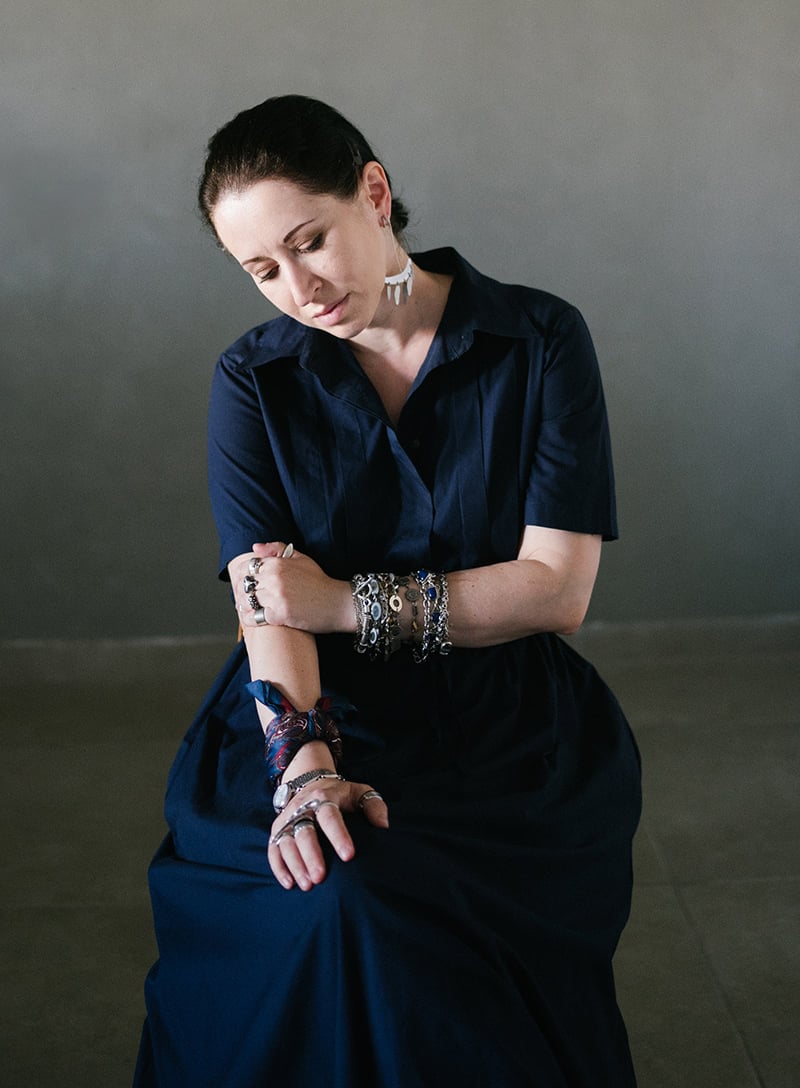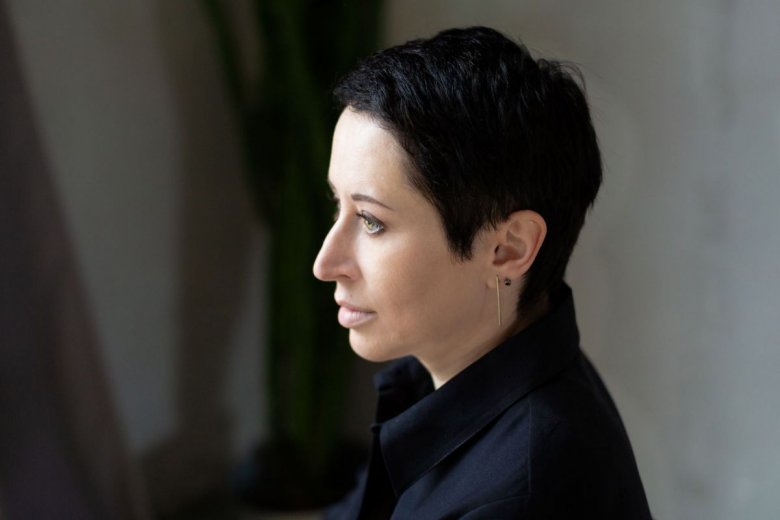Linor Goralik is a poet, writer, translator, journalist, marketing specialist, fashion theorist, painter, and recently also a jeweler. She has created various media projects, where she tries to weave her private, even very narrow personal view into a bigger context.
It can be said that Linor Goralik is a creator of context, she’s very good at feeling how the laws of storytelling work when we are all capricious consumers. And in the digital age, it is a great gift, because the connection between events, people, goods, services, feelings and meanings is much more subtle and interesting.
Now the content we are offered has reached huge volumes, and Linor Goralik considers it wonderful. A little scary, of course, but wonderful, because there are more choices.
She is convinced that each person has a variety of interesting stories, but not all of them can be turned into text or stories filled with imagery. And we need people who are able to capture those stories, to coax them out of people. For example, ethnographers, anthropologists or journalists.
To be the voice of those who cannot speak. This is approximately what Linor Goralik suggests.
And since storytelling is also a commercial skill, Linor Goralik will conduct a social media management and content marketing course for Armenian media experts, SMM specialists and media executives on March 10-12.
The training is being organized by the Swedish FOJO Media Institute and the Media Initiatives Center.
During this bombardment of information, how does the logic behind text delivery and sales change? When everything is too much, is it difficult to find what is necessary or vice versa?
I think we are in a situation when a fundamentally new consumer of content has appeared.
First of all, this new consumer has seen a lot of content. And the abundance of content made them capricious, as they have come across the best and brightest samples of content.
It’s not an issue of there being too much content, but that one can come across stunning examples of content.
First of all, the new type of consumer already has a wide field to make comparisons. Whatever we offer them, it will not be news (with rare exceptions). And if we do not put in a lot of effort, we will not be able to surprise them.
The second important observation is that we are dealing with the consumer, who creates content themselves.
A person involved in creating content immediately begins to understand how we do it and what it means to produce a photo, video, or text. Even if it is done on completely different levels, a person already compares what they have seen and read with their own experience. And that affects how they perceive our work.
Third, the new consumer is free to choose content. They have an irrevocable choice of what to focus on and what not to focus on. Yes, we are no longer at the center of their world no matter how hard we try.
Fourth, the new consumer is a person who verifies the content that deserves their attention every day. If we allow inaccuracies, small frauds or small mistakes at any point, we must be prepared that there will always be users who, by entering the bowels of our content and digging into everything, will show it to us. And they will never allow us to weaken.
And these factors create a situation when it becomes more and more difficult to penetrate the consumer’s attention. And the content changes every step of the way.
New channels, new formats, ways of consuming them and finally, new tones with which the content is created, are appearing before our eyes. And all this put together brings us to a new reality, where it is very difficult to get the audience’s attention (I try to avoid the word “sell”). And in a sense, that’s a good thing.
Is being surprising the starting point?
Being interesting.
I had the pleasure of working with Vladimir Yakovlev, the founder of Kommersant, who always said that it was very easy to create Kommersant because it became a kitchen of the field during the war.
There was no information at all, and people had to be fed somehow. In other words, it was not difficult to expand the field’s kitchen and feed the hungry soldiers with ordinary porridge. It was enough for the porridge to be normal, fresh, tasty, hot, non-toxic, and everything would be fine.
Now the situation is fundamentally different. Now you need to try to invite people to a restaurant while being located on a huge street filled with restaurants.
And now, yes, we are in that situation.
And what is the role of the political component? In any case, the shadows and tones of politics can be seen behind almost all types of content in Armenia. Is politics a mandatory spice or an unnecessary component?
A lot depends on what content we mean. But I have a feeling that the work becomes complicated when the content is too politicized.
But on the other hand, a huge amount of content is already politicized, even when the creators of that content do not understand that what they have created is politicized.
It’s good for the consumer when the media thinks it has a customer. Often the audience does not even understand that. And it seems to me that this, yes, is a new reality. And a very normal reality.
Of course, I really understand that the social, cultural and political upheavals that Armenia has gone through in recent years do not allow us to imagine that it is possible without it. What can you do? We’re in such a period when the work of the media is complicated and hard.
In your opinion, taking into consideration the significant amount of anonymity on social media, what are people in the social media space like now?
I think one way or another we are moving towards a strange world where we want to find more anonymity than we have. Now we are in a situation when many social networks work on the basis of non-anonymity. For example, Facebook or the newly created Clubhouse are not anonymous. In other words, social networks do not encourage anonymity. And for the most part, people are getting used to the fact that they can no longer be anonymous in the broadest sense on the Internet.
I have followed several social network experiments when people expressed themselves in complete anonymity. And, of course, it leaves a very heavy impression: people fall to a very low level very quickly.
Aggression and insults increase. Why?
Because aggression has accumulated in people. We are a civilization that puts a tough ban on spreading aggression. And, of course, if you forbid something for a long time and keep it closed up, it will definitely leak out to the outside world at the first opportunity.
You have projects where small stories follow each other and reveal a big story. What is the principle you use to work with personal stories in your stories, PostPostMedia or Private faces projects?
I see huge narratives behind every small plot. Luckily for me, maybe my internal optical settings work in such a way that one or two sentences are sometimes enough for me to catch some big story, some layers of big events. This is probably how it works in my case.
When a person expresses themselves freely, they usually fall into a rather emotional and pathetic field, hiding in common words. How can pathos be avoided, especially in the media?
Journalists are taught to do so based only on facts. That is, never write about your own feelings, emotions, attitudes and talk only about what really happened.
But on the other hand, sometimes pathos is not a bad thing. I think so at least. After all, people can talk about their feelings as they please.
Of course, fact-based journalism works on a different principle. I appreciate these principles very much and I am afraid of the large-scale attack that is now being carried out against the journalism of facts. What is happening in Russia now is just terrifying. Fact-based journalism is something that should be supported in all cases and as much energy as possible should be invested to protect it.

Linor Goralik
I believe in the facts. But that does not stop me from highly appreciating the stylistics and belles-lettres that help to show how people feel and how they experience events.
It seems to me that both of them are important genres and both of them are in great demand if we return to the topic of texts that are in demand.
In some situations, a pathetic style may be justified. For example, in poetry, everything can be allowed. A poetic text can be as pathetic as you want, and it will be appropriate.
And when fact-based journalism and, say, patriotic pathos are combined, we always understand that we are dealing with propaganda.
So, a lot depends on the genre, the platform, the style of expression and the author.
Are some practical lessons possible to help the author or journalist understand that they (perhaps unwittingly) are entering the realm of propaganda?
I am sure that this question also has a formulated scientific answer. Very clever people have been doing this, trying to characterize how propaganda material differs from simple material and have developed special techniques to determine it. I will not be able to answer that question easily.
But for me personally, I have decided that when you try, not to tell the audience about something, but to persuade them, you should be careful.
If you are a journalist and you want to persuade instead of tell, it is worth stopping and thinking about what you are doing.
The job of marketing is to persuade. Including the consumption of news products.
Yes, and that’s normal.
But if you are a journalist of facts, in the pure, naked sense of that genre, you should try not to persuade the audience of something, but to impart knowledge to people. If you are trying to convince the audience of something, you have to admit that you are not a journalist, but are engaged in a completely different job – propaganda. And that is a normal job, it is just a different job, not journalism.
But perhaps you will have to account for it yourself.
For example, official Russian journalism is no longer journalism. As a marketing professional, I can say that it is another profession to work with information. It is also a normal profession, but not journalism.
And, of course, there is fact-based journalism. It is small, but it exists.
You have many different professions, as was customary in the Renaissance. Is mastering a broad range of professions more promising than focusing on narrow specialization?
Everyone can develop and master new professional skills, maybe complete professions. We’ve found ourselves in a world where not doing so is no longer possible.
As a result of my interactions with my colleagues and students, I see that people who are able to learn something new in any situation and at any age, adapt their knowledge to reality and open new horizons, feel much more confident and find their place in society more effectively.
Such is the dynamics, yes.
Do we see an interesting movement in the media field of Armenia?
I had the honor to work with the Armenian media right before the deep political cataclysms and I watched with pleasure how the media platforms, which with great difficulty survived in the old political situation, began to flourish and stand on their feet. And justly reach the heights they were always ready for from a professional point of view.
I follow their work with pleasure and I would be happy for the independent media of Armenia to be able to grow and flourish in the future.
Interview By Nune Hakhverdyan







